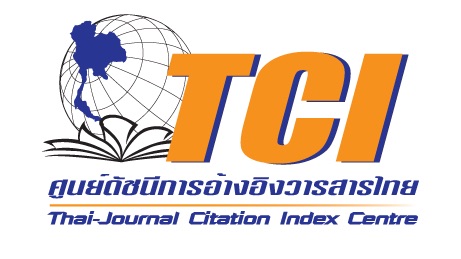ผู้นำการเปลี่ยนแปลงทางสังคมตาม หลักเศรษฐกิจพอเพียงของตำรวจในประเทศไทย
Keywords:
Social Change Agent, PoliceAbstract
งานวิจัยนี้มีวัตถุประสงค์เพื่อศึกษาบริบทประเทศไทย บทบาทของผู้นำ การเปลี่ยนแปลงทางสังคม วิเคราะห์องค์ประกอบผู้นำการเปลี่ยนแปลงพร้อมกับข้อเสนอแนะเชิงนโยบายการพัฒนาบทบาทผู้นำ ใช้วิธีวิจัยด้วยการสังเกต การสัมภาษณ์ในกรณีศึกษา 7 คน ผลการวิจัยพบว่า บริบทของประเทศมีการปรับใช้หลักเศรษฐกิจพอเพียงและหลักพุทธธรรมแบบพึ่งพาตนเอง ทำให้เกิดดุลยภาพระหว่างมนุษย์กับธรรมชาติเพื่อนำไปสู่การพัฒนาอาศัยกระบวนการปฏิบัตินำร่องจนมีอิทธิพลต่อความศรัทธา และนำไปสู่ การเปลี่ยนแปลงความคิดของชาวบ้านด้วยคุณลักษณะ 4 ประการ ข้อเสนอเชิงนโยบายการพัฒนาบทบาทผู้นำการเปลี่ยนแปลงทางสังคมตามปรัชญาเศรษฐกิจพอเพียงของตำรวจในบริบทของภาคตะวันออกเฉียงเหนือของประเทศไทยได้ 6 นโยบาย 12 มาตรการ
This research aimed to study contexts of Thailand, roles of leaders of social changes in the countries, and the leaders’ key elements. The social change agents were analyzed and introduced policy recommendations for leadership role development. The data was collected by observation and interview with the 7 social change leaders. The study results showed that the contexts involved living the principles of sufficiency economy and Buddhist self-reliance, which helped keeping the balance between nature and human needs, and eventually leading to sustainable development. Many pilot programs, with 4 key elements, had been conducted and influenced people thoughts and beliefs. In the end, 6 policies and 12 measures for leadership role development were introduced in accordance with the principle of sufficiency economy for police officers in the northeastern region of Thailand.
References
พรทิพย์ แก้วมูลคำ. (2560). การบริการราชการแบบมีส่วนร่วม. กรุงเทพฯ: ศูนย์สื่อและสิ่งพิมพ์แก้วเจ้าจอม มหาวิทยาลัยราชภัฏสวนสุนันทา.
รัตติกรณ์ จงวิศาล. (2557). ภาวะผู้นำ. กรุงเทพฯ: สำนักพิมพ์แห่งจุฬาลงกรณ์มหาวิทยาลัย.
สมเด็จพระพุทธโฆษาจารย์ (ประยุทธ์ ปยุตโต). (2559). พุทธธรรม. (พิมพ์ครั้งที่ 5). กรุงเทพฯ: มหาจุฬาลงกรณราชวิทยาลัย.
สำนักงานคณะกรรมการพัฒนาการเศรษฐกิจและสังคมแห่งชาติ. (2560). ปรัชญาของเศรษฐกิจพอเพียงและการประยุกต์ใช้. กรุงเทพฯ: สำนักยุทธศาสตร์ด้านนโยบายสาธารณะ.
สำนักงานตำรวจแห่งชาติ. (2559). โครงการประเมินระดับความสำเร็จของการดำเนินงาน ประจำปีงบประมาณ พ.ศ. 2559. กรุงเทพฯ: กองวิจัย สำนักงานยุทธศาสตร์ สำนักงานตำรวจแห่งชาติ.
สุภางค์ จันทรวานิช. (2540). วิธีการวิจัยเชิงคุณภาพ. กรุงเทพฯ: สำนักพิมพ์จุฬาลงกรณ์มหาวิทยาลัย.
อนุรักษ์ ปัญญานุวัฒน์ . (2548). การศึกษาชุมชนเชิงพหุลักษณ์: บทเรียนจากวิจัยภาคสนาม. กรุงเทพฯ: โครงการเสริมสร้างการเรียนรู้เพื่อชุมชนเป็นสุข (สรส).
อภิชัย พันธเสน. (2560). เศรษฐกิจพอเพียง: พระอัจฉริยภาพและพระกรุณาธิคุณของในหลวง รัชกาลที่ 9. กรุงเทพฯ: สำนักพิมพ์มหาวิทยาลัยรังสิต.
อัจฉรา ภาณุรัตน์. (2555). เศรษฐกิจและนิเวศวิทยาสิ่งแวดล้อม, ขาดทุนคือกำไร. สุรินทร์: สำนักพิมพ์มหาวิทยาลัยราชภัฏสุรินทร์.
Baker. W. E. and Sinkula, J. M. (1999). The Synergistic Effect of Market Orientation and Learning Orientation on Organizational Performance. Journal of the Academy of Marketing Science, 27, 411-427.
Bass, B. M. (1990). Transformational leadership development. California: Consulting Psychologists Press.
Boyle. (1981). Manager’ leadership and critical care nurses’ intent to stay. American Journal of Critical Care, 2, 42-47.
Daft. (2011). Leadership: Theory and practice. Fort Worth, TX: Dryden Press.
Fisher, Paula. (2010). An investigation of leadership best practices and teacher morale in six community college child development centers in southern California. Dissertation. Capella University.
House, R. J. and Mitchell, R. R. (1974). “Path-goal theory of leadership.” Journal of Contemporary Business, 3, 81-97.
Koontz, H. and Weihrich, F. (1994). Essentials of Management. New York: McGraw – Hill.
Person, J. L. (1993). An Examination of The Relationship Between Participative. Management and Perceived Institutional Effectiveness in North Carolina Community Colleges. Dissertation Abstracts International. 53 (15): 1351 – A.
Roscoe, John T. (1975). Fundamental Research Statistics for the Behavioral. New York: Sciences, Holt, Rinehart and Winston Inc.
Seers, D. (1969). “The Meaning of Development.” International Development Review 11. 2-6.
Downloads
Published
How to Cite
Issue
Section
License

This work is licensed under a Creative Commons Attribution-NonCommercial-NoDerivatives 4.0 International License.







